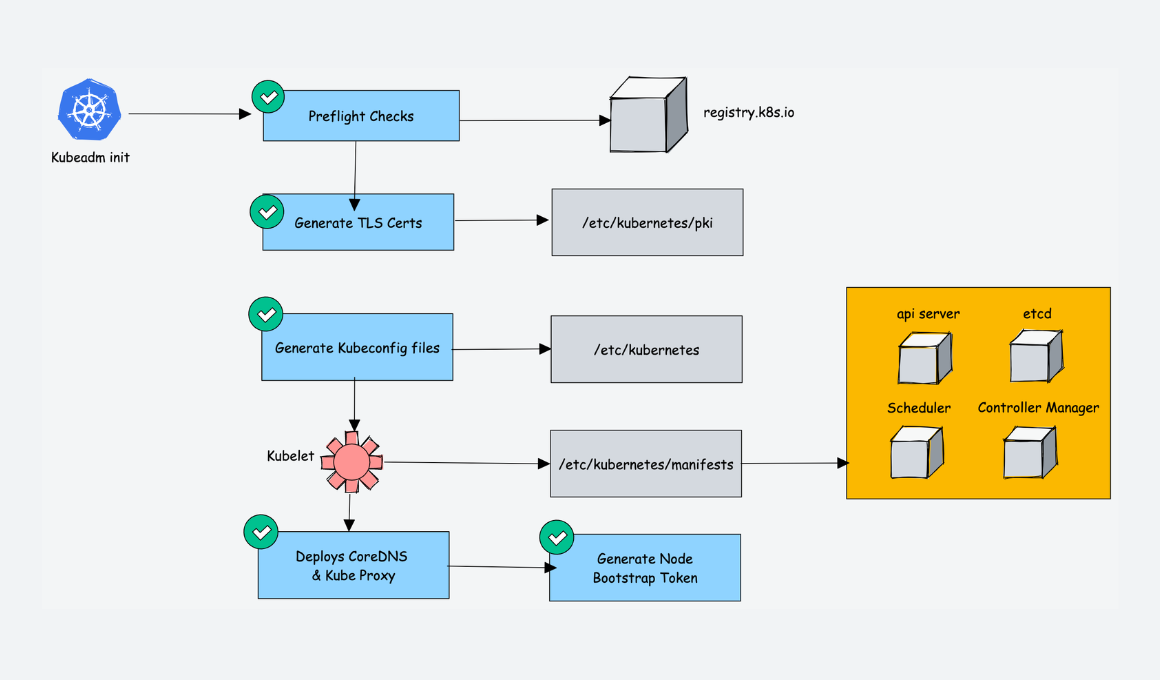synopsis
preflight Run pre-flight checks
certs Certificate generation
/ca Generate the self-signed Kubernetes CA to provision identities for other Kubernetes components
/apiserver Generate the certificate for serving the Kubernetes API
/apiserver-kubelet-client Generate the certificate for the API server to connect to kubelet
/front-proxy-ca Generate the self-signed CA to provision identities for front proxy
/front-proxy-client Generate the certificate for the front proxy client
/etcd-ca Generate the self-signed CA to provision identities for etcd
/etcd-server Generate the certificate for serving etcd
/etcd-peer Generate the certificate for etcd nodes to communicate with each other
/etcd-healthcheck-client Generate the certificate for liveness probes to healthcheck etcd
/apiserver-etcd-client Generate the certificate the apiserver uses to access etcd
/sa Generate a private key for signing service account tokens along with its public key
kubeconfig Generate all kubeconfig files necessary to establish the control plane and the admin kubeconfig file
/admin Generate a kubeconfig file for the admin to use and for kubeadm itself
/kubelet Generate a kubeconfig file for the kubelet to use *only* for cluster bootstrapping purposes
/controller-manager Generate a kubeconfig file for the controller manager to use
/scheduler Generate a kubeconfig file for the scheduler to use
kubelet-start Write kubelet settings and (re)start the kubelet
control-plane Generate all static Pod manifest files necessary to establish the control plane
/apiserver Generates the kube-apiserver static Pod manifest
/controller-manager Generates the kube-controller-manager static Pod manifest
/scheduler Generates the kube-scheduler static Pod manifest
etcd Generate static Pod manifest file for local etcd
/local Generate the static Pod manifest file for a local, single-node local etcd instance
upload-config Upload the kubeadm and kubelet configuration to a ConfigMap
/kubeadm Upload the kubeadm ClusterConfiguration to a ConfigMap
/kubelet Upload the kubelet component config to a ConfigMap
upload-certs Upload certificates to kubeadm-certs
mark-control-plane Mark a node as a control-plane
bootstrap-token Generates bootstrap tokens used to join a node to a cluster
kubelet-finalize Updates settings relevant to the kubelet after TLS bootstrap
/experimental-cert-rotation Enable kubelet client certificate rotation
addon Install required addons for passing conformance tests
/coredns Install the CoreDNS addon to a Kubernetes cluster
/kube-proxy Install the kube-proxy addon to a Kubernetes cluster
options
--apiserver-advertise-address string--apiserver-bind-port int32Default: 6443--apiserver-cert-extra-sans strings--cert-dir stringDefault: "/etc/kubernetes/pki"--certificate-key string--config string--control-plane-endpoint string--cri-socket string--dry-run--feature-gates string: A set of key=value pairs that describe feature gates for various featuresPublicKeysECDSA=true|false(ALPHA - default=false)RootlessControlPlane=true|false(ALPHA - default=false)UnversionedKubeletConfigMap=true|false(BETA - default=true)
-h,--help--ignore-preflight-errors strings--image-repository stringDefault: "k8s.gcr.io"--kubernetes-version stringDefault: "stable-1"--node-name string--patches string--pod-network-cidr string--service-cidr stringDefault: "10.96.0.0/12"--service-dns-domain stringDefault: "cluster.local"--skip-certificate-key-print--skip-phases strings--skip-token-print--token string--token-ttl durationDefault: 24h0m0s--upload-certs--rootfs string
init workflow
- preflight checks
- generate the necessary certificates
- generate kubeconfig files for control plane components
generate static pod manifests for control plane components
- api server
- controller-manager
- scheduler
[!TIP] kubeadm writes static Pod manifest files for control plane components to
/etc/kubernetes/manifestsstatic pod manifest generation for control plane components can be invoked individually with thekubeadm init phase control-plane allcommandreferences:
wait for the control plane to come up
[!TIP] kubeadm waits (upto 4m0s) until
localhost:6443/healthz(kube-apiserver liveness) returnsok. However in order to detect deadlock conditions, kubeadm fails fast iflocalhost:10255/healthz(kubelet liveness) orlocalhost:10255/healthz/syncloop(kubelet readiness) don't returnokwithin 40s and 60s respectively.save the kubeadm clusterconfiguration in a configmap for later reference
mark the node as control-plane
[!TIP] Please note that:
- The
node-role.kubernetes.io/mastertaint is deprecated and will be removed in kubeadm version 1.25 - Mark control-plane phase phase can be invoked individually with the
kubeadm init phase mark-control-planecommand
- The
- install addons
init steps

[!NOTE|label:references:]
- How to Setup Kubernetes(k8s) Cluster in HA with Kubeadm
- Creating Highly Available Clusters with kubeadm
- Multi-Master Kubernetes Cluster Setup with CRI-O and vSphere Storage on CentOS 8
- cri-o/tutorials
- 在Kubernetes中使用CRI-O运行时
- 使用 Kubeadm 和 CRI-O 在 Rocky Linux 8 上安装 Kubernetes 集群
- kubernetes cri-o浅尝
- AlmaLinux基于cri-o+Calico用kubeadm搭建1.24版本多master高可用Kubernetes集群
- etcd-io/etcd
- 详解 K8S 高可用部署
- others:
- environment setup
- install container runtime
- High Availability
- kuberentes packates
- init first control plane
- join peer control planes
- join work nodes
- install network plugin
- install ingress
- addons
- setup tls
troubleshooting
-
$ kubectl run curl-deploy --image=quay.io/curl/curl:latest -i --tty -- sh $ curl <clusterIP>:<svcPort> # resume $ kubectl attach curl-deploy -c curl-deploy -i -t